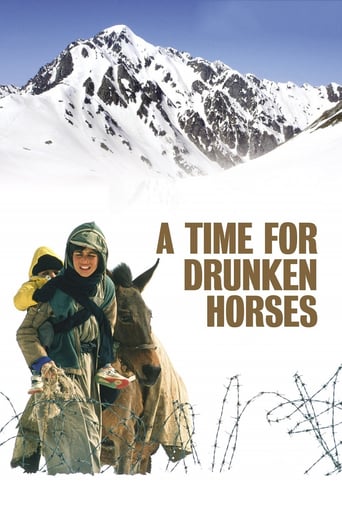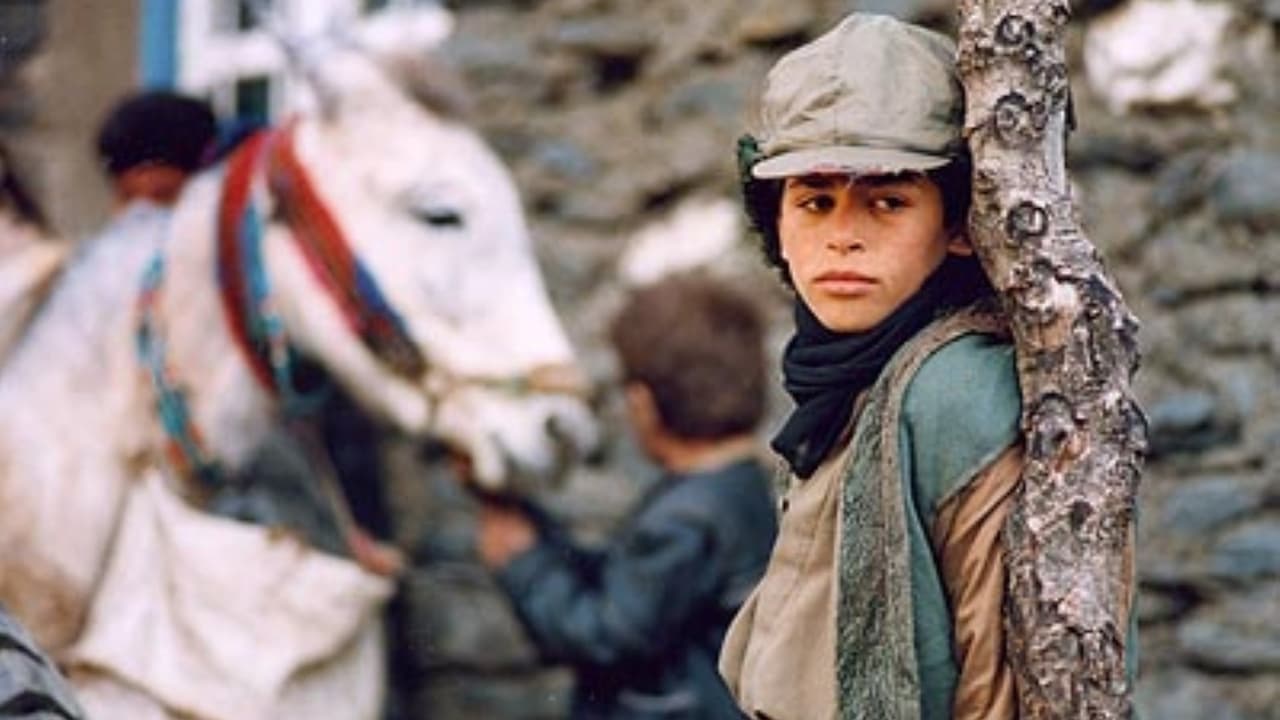tao902
An Iranian film about the day to day reality of life for the Kurdish minority, which also exists in Iraq, Turkey and Syria. The film reveals their harsh life, the injustices they experience, pointing towards and justifying their desire for an independent Kurdish state.The father of a Kurdish family has died and their situation becomes desperate when on of the children urgently requires medical attention. The eldest son, Ayoub, becomes head of the family and takes responsibility for earning sufficient money for them to survive and to afford an operation for his brother. Their survival often requires the smuggling of goods across the Iraq/Iran border through snow covered mountains in extremely inhospitable conditions. The mules/horses used for transport are often given alcohol to dull their senses against the harsh environment.A slow film, as is required by the story. Wonderful acting, especially from the children.
Tim Kidner
When your own, Western, cosseted and safe children start moaning about not having the latest 'must-have', play them this. They'll soon shut up, I promise!From the moment I first watched this enigmatically titled film on TV many years ago, I knew it was to become an absolute favourite of mine. Now, at last, I've got it on DVD and can watch it again (& again).There's something very resolutely matter-of-fact in these people's harshness and the extents to which they have to go to address them. It seems ironic - and a bit ridiculous here in the West, where we like a a drink or two, that liquor is not drunk by people, but force fed to the pack mules and horses to numb them enough to make dangerous black-market trips over the snowbound mountain and into Iraq.The main characters are the children, totally without whimsy or sentiment that simply try and make do without parents. That this includes a severely handicapped boy who not only needs daily medication but an operation to prolong his life - and their inventive means to try and fund that is bound to fire our emotions and one admires with both pride and pity.This is definitely one of those very rare (& indeed, it is rare, i.e difficult to see/get hold of) that WILL affect you and probably far more than you'd dare realise. Ten out of 10.
valadas
The documentary style of this movie doesn't put us away from the drama of life in this Kurdish village in Iranian soil but on the border with Irak. People there make a living by smuggling goods over the border subject to the constant risk of mines and ambushes. This involves children as well as adults. Life is particularly hard for children who have also to work for a living either wrapping up objects in the towns or carrying heavy packages on their shoulder or conducting mules carrying them across the border in the middle of the harshest weather conditions and a hostile landscape, to be sold on the other side. This is also the story of a family of orphan children, one of them being a crippled boy whose siblings treat with extreme care and tenderness, trying to earn money enough to take him to Irak to be operated otherwise he'll die soon. The image style is simple and unadorned. The images speak indeed for themselves. This story tells us not only how people live in that region of the globe, showing their customs and culture, but also how poverty and hardness cannot untie there the bonds of love in the bosom of the family. Maybe something we could learn in our western societies.
Renelson Antonius Morelos
Just like the other Iranian films that I've seen---Jafar Panahi's "White Balloon," Majid Majidi's "Children of Heaven," Abbas Kiarostami's "Where Is My Friend's Home?" and Ebrahim Forouzesh's "The Key"---Bahman Gobadi's "Zamani baraye masti ashba" also has children as the central characters.But whereas the children in Panahi's, Majidi's, Kiarostami's and Forouzesh's films appear to struggle with "simple" problems (gold fish, a pair of shoes, a friend's lost notebook and a house key), those in Gobadi's film deal with problems that take on a large-scale significance:how to keep one's body and soul together amid the escalating war between two Muslim countries, the protagonists being literally situated in the middle. As his first full-length feature, Gobadi aims, as he tells us in the prologue, to make the viewers aware of the plight of the people of Kurdistan, who are unjustly marginalized and neglected, their situation becoming all the more worst as the village stands on the border between the warring Iran and Iraq (it's the time of the Gulf War).As I've already suggested, the focus here is particularly on the orphaned Kurdish siblings, headed by the affectionate and vulnerable Ayoub.To support his brothers and sisters, and most specially the ailing Madi, who needs to be operated in Iraq, Ayoub works for a group of smugglers who uses children in transporting illegally-obtained goods to Iraq. The opening scene of a pressure-filled and hurriedly-done packing of smuggled products, presented with the use of a hand-held camera and undiluted colors (so that it has the look and feel of a documentary), and the shots of the snow-covered mountain along which the group of adults and children carry their goods, in a manner that is threatening rather than awe-inspiring, make it clear that the road ahead for the young protagonists won't be a smooth one, that life won't be a piece of cake, as should be proper for them, being tender and innocent as they are. Though Gobadi chooses to present the story objectively, that is, in a manner where sympathy and hate won't be readily expressed to the persons concerned, being aware of the fact that theirs is a life being largely conditioned by the circumstances, I still think that the film belongs to the children, most specially to Ayoub. It's hard not to admire Ayoub's selfless devotion to his siblings, even if it means having to be used callously by a group of adult smugglers (one of them is an uncle), having to endure the coldness, the thick blanket of snow and the steepness of the mountains as they transport the goods using "drunken horses" (hence, the title) and having to "sacrifice" an elder sister to an arranged marriage in the hope of having Madi operated, courtesy of the groom's family (which turns out to be a false hope). One would think that such kind of fate is too much for a young child, but like the above-mentioned Iranian films, "Zamani baraye masti ashba" ends with the image of a child quietly enjoying a moment of triumph.What will become of him (or her) from thereon? Whatever, what counts for the time being is the simple joy brought about by a simple victory.


 AD
AD


